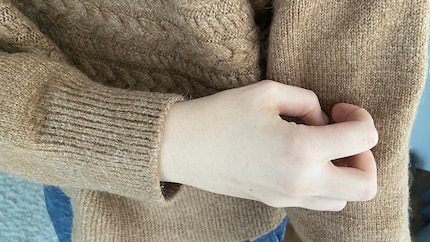
Guide
This wreath is so fluffy you'll want to stroke it
by Stefanie Lechthaler

Knitwear isn’t always soft enough to snuggle into. It can, in fact, be stubbornly scratchy. Before you chuck that prickly pullover in the recycling, however, make sure you try out these hacks.
There’s nothing worse than the feeling of an itchy, knitted jumper. If you tend not to go for synthetic fabrics, you’ll know this predicament: unlike man-made fibres, natural ones can itch like crazy. That’s down to the rough surface of the wool: the thicker the fibres, the itchier it is. If you don’t want to suffer like Leonard Hofstadter did in the hit series «The Big Bang Theory», find out how to turn the rough fibres of your jumper into fluffy ones, here.

Pop your jumper into a plastic bag and store it in your freezer for a few hours. As soon as the wool fibres defrost, they’re much more pliable. Because the cold makes the fibres stand on end, they adhere better to the woollen fabric, meaning less lint forms on the jumper. This way, it doesn’t just feel less scratchy, but stays looking new for longer. You can get rid of pills particularly easily by using a fabric shaver.
If that trick doesn’t work, it’s time to bring out the big guns. Using a detergent suitable for wool is essential if you want to keep your jumper soft as well as clean. It protects the keratin (link in German) present in the wool, keeping the fibres elastic and fluffy. The enzymes found in conventional washing powders, including proteases (which break down proteins), cause the wool fibres to swell, which leads to felting. So, back to washing. Before you start the washing machine, turn your woollies inside out, set your machine to the wool programme and choose a low spin speed. The drum shouldn’t be more than half-full, as this can lead to increased friction between the items inside, making the fibres rough. Dry your jumper by laying it out flat on a towel, and avoid leaving it on a radiator or in direct sunlight. Heat makes wool fibres hard and scratchy.

Don’t have any wool detergent lying around? No problem. A typical conditioner should do the trick too. After all, if it can be used to care for human hair, it can’t damage an animal’s. Mix one part conditioner with one part vinegar and two parts water. I’d use the measuring cap on a detergent bottle to do this. Add two tablespoons of the resulting mixture to the detergent drawer, turn your knits inside out and wash them as described in trick #1. Make sure that the conditioner doesn’t contain any proteases, as these enzymes damage the keratin in the wool, leading to rough fibres and pilling.
Generally speaking, the less you wash your jumper, the better. Unnecessary washing will wear it out in the long-term – even if you take really good care of it. Instead, try hanging it out in the fresh air. Bacteria which cause unpleasant smells thrive on smooth surfaces, but because wool, unlike man-made fibres, has a crimped surface, you don’t have to wash it as often. It’s a win-win – for you and the environment.
When I’m not exploring the depths of the sea as an open water diver, I enjoy plunging into the world of fashion. On the streets of Paris, Milan and New York is where I keep my eyes peeled for the latest trends. And I’ll show you how to take them from the catwalk to your everyday life.
Practical solutions for everyday problems with technology, household hacks and much more.
Show all